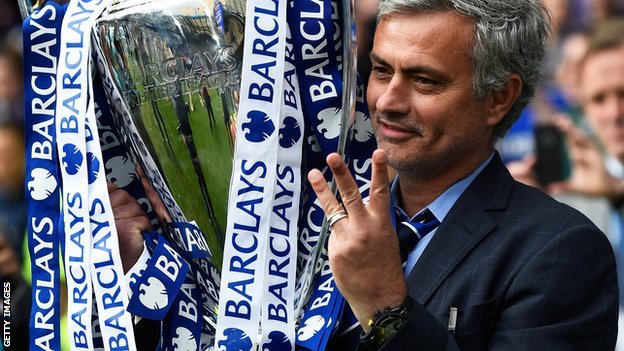
Jose Mourinho, despite winning his third league title with Chelsea in May 2015, has been sacked
Jose Mourinho: Why it went wrong for manager at Chelsea
Jose Mourinho had brought his third Premier League title to Chelsea – the first since his return for a second spell at Stamford Bridge – and he was putting pen to paper on a new four-year contract.
It was 7 August 2015 and all was right in Chelsea and Mourinho's world. They were favourites to retain their crown and he spoke about building a team that would give Chelsea a 10-year dynasty.
Now 'The Special One' has been sacked by Blues owner Roman Abramovich for a second time after the most spectacular, unexpected decline suffered by any Premier League champions.
So how did it all go wrong for Mourinho in a matter of months?
Did complacency set in?
Five reasons why Chelsea won the Premier League
Chelsea secured the 2014-15 title with victory over Crystal Palace and with three games to spare.
They were in control of the race from almost the first kick and the eventual margin of triumph was a comfortable eight points from deposed champions Manchester City with only three defeats all season.
Did this margin lead to fatal complacency, not only within Chelsea's boardroom but from Mourinho himself?
Did Chelsea make the same mistakes as Manchester City after winning the Premier League in 2012 when they failed to strengthen their squad sufficiently, bringing in low-key signings such as Brazilian veteran Maicon, Scott Sinclair, Jack Rodwell and Javi Garcia? The title was lost to Manchester United in Sir Alex Ferguson's final season.
And did Mourinho and his paymasters fail to heed the warning signs that their rivals – especially City – would be wounded and react in a manner that meant Chelsea needed to build instantly from that position of strength.
City's response to losing the title was to bring in stellar signings, such as £49m Raheem Sterling from Liverpool, £55m Kevin de Bruyne from Wolfsburg and £32m defender Nicolas Otamendi from Valencia.
Chelsea were linked with the likes of Juventus' Paul Pogba and Real Madrid's outstanding young defender Raphael Varane. They did not arrive – City's ruthless ambition left Mourinho standing.
Instead, the pursuit of Everton's England international John Stones became lengthy, acrimonious and eventually doomed as the Merseysiders stood firm – even in the face of a transfer request from the 21-year-old defender.
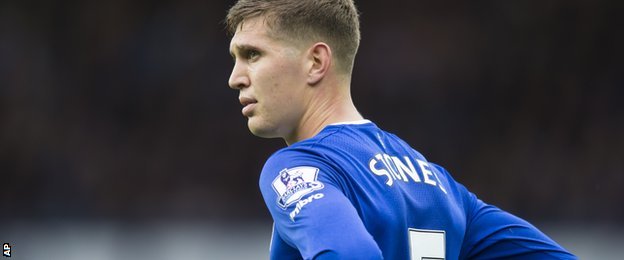
Everton's John Stones was a big target for Chelsea in the summer
Pedro did arrive from Barcelona for £21m and left-back Baba Rahman from Augsburg for £21.7m but otherwise – apart from £8m spent on Stoke City keeper Asmir Begovic to replace the departed Petr Cech – it was unimpressive.
Mourinho's squad was fleshed out but not strengthened.
Papy Djilobodji came from Nantes for £4m and Reading's Michael Hector for the same fee. Djilobodji was barely seen and Hector went straight back to the Championship club.
For all the criticism he has received, was Mourinho let down by Abramovich and Chelsea's hierarchy, who failed to deliver the signings, such as Stones, that the manager clearly wanted?
How much did he really want Rahman, hardly a priority at such a huge price with Cesar Azpilicueta doing such an outstanding job at left-back last season?
Rahman came to notice with Ghana under former Chelsea manager Avram Grant, someone who – rather mysteriously given his track record in football – has had the ear of Abramovich in the past.
And what of Djilobodji, who came from nowhere without serious pedigree, a player Mourinho admitted was not his choice, although he said: "It was the choice of someone I trust completely."?
Not enough, though, to actually give him a run in the first team.
The loan signing of Radamel Falcao seemed almost an attempt to prove he could succeed where Manchester United and Louis van Gaal failed. He also failed – expensively.
Mourinho's other error came from an understandable desire to renew a Chelsea team he felt was jaded at the end of last season.
For a manager who prides himself on his teams making a fast start to the season, Mourinho's decision to move in a new direction with a shorter pre-season, giving his players a month's holiday and only three matches before the Community Shield loss to Arsenal, holed Chelsea's season below the waterline even before kick-off.
Chelsea did not win any of those pre-season games, which included a 4-2 defeat by New York Red Bulls.
They looked off the pace from the first kick against Swansea City in their opening game and momentum was never gained. Fatally.
‘The Curse Of Eva Carneiro’
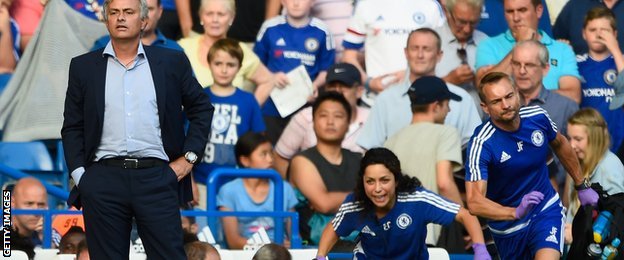
Jose Mourinho looks on as former club medic Eva Carneiro races to attend to injured Chelsea midfielder Eden Hazard
Mourinho's hopes of a smooth transition into Chelsea's title defence were derailed from the opening game against Swansea City at Stamford Bridge and a disagreement with team doctor Eva Carneiro that has provided an acrimonious backdrop to the season.
He was furious that, with Chelsea already reduced to 10 men after keeper Thibaut Courtois was sent off, Carneiro and fellow medic Jon Fearn raced on to treat Eden Hazard even though the manager felt it was not required. It was a response that led to Mourinho, angry that his side were briefly reduced to nine men, accusing the medics of being "impulsive and naive".
Both had their positions downgraded but the row with Carneiro rumbled on, with Mourinho criticised by the medical profession, including the Football Medical Association (FMA), which represents medical staff in the sport.
Mourinho was cleared of making discriminatory comments to Carneiro but Football Association chairman Greg Dyke, in a letter to FA council members, said Chelsea's manager had "made a mistake" and should apologise.
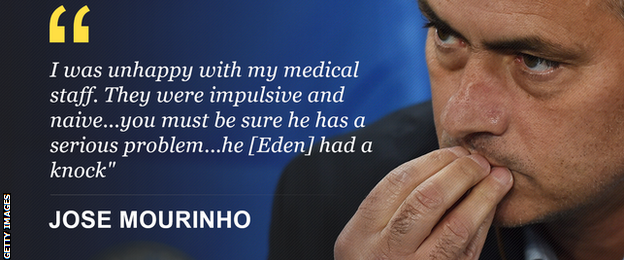
Jose Mourinho expressed his concerns at how the Chelsea medical team dealt with Eden Hazard once his team were already down to 10 men
As Chelsea and Mourinho's struggles continued – along with his brushes with authority – the Carneiro affair continued.
Carneiro's lawyers are suing Chelsea for constructive dismissal while Mourinho himself is the subject of an individual legal action.
The saga has been referred to on social media as "The Curse Of Eva Carneiro", reflecting on how Chelsea and Mourinho's fortunes plummeted from the moment he crossed swords with the former club doctor.
It set the tone for Mourinho constantly being at odds with authority, particularly when he was given a one-match stadium ban and a £40,000 fine for an expletive-filled rant at referee Jon Moss which led to him being sent off at half-time in the loss at West Ham in October.
Mourinho had an appeal against a £50,000 FA fine and a suspended one-match ban dismissed following his claims after the 3-1 home defeat by Southampton in early October that referees were afraid of giving Chelsea penalties.
Mourinho was locked on course for trouble from day one of the season and it played its part in his downfall.
Sadly, and this is said as someone who has always been an admirer of Mourinho's behaviour and the flourishes he has brought to Chelsea and the Premier League, his behaviour this season has not been befitting of the club or himself.
The Deluded One
Mourinho: 'From winner to whinger'
Mourinho's defiance had been one of his trademarks – but as the cracks have appeared in both his and his team's make-up this season he has crossed the border into desperation and delusion.
The first signs that all was not well on the field with the champions came in the 3-0 loss to Manchester City in the second game of the season when they were swept away at the Etihad.
Chelsea were so ill-at-ease Mourinho was forced to substitute the symbol of his methods and successes, captain John Terry, at half-time after he was cruelly exposed by City's pace – to no effect.
And in his post-match inquest, Mourinho chose to claim the result was "fake" and that his team deserved more. The remarks were met with utter bemusement as the only way in which the result was fake was that City would have won by more had it not been for Chelsea keeper Asmir Begovic.
It was perhaps a symptom of Mourinho's distraction that he repeated the trick after another comprehensive 3-1 defeat at Everton in September, claiming "the game was completely under control" even when Roberto Martinez's side were two up within 22 minutes.
If it was an act it was an unconvincing one. If he fooled anyone it was only himself.
And for someone who gloried in describing Arsenal manager Arsene Wenger as a "voyeur" for his perceived interest in Chelsea and a "specialist in failure", were the tables finally turned? Was Mourinho becoming over-interested in Wenger?
Did he suddenly see Arsenal as a potential threat again?
The pair's frosty relationship was on show in public when Arsenal beat Chelsea in the Community Shield and again with the coldest of handshakes before Mourinho's side won 2-0 at Stamford Bridge in September.
In one of Mourinho's darkest moments, as he was sent off at half-time in the loss at West Ham, according to the referee Jon Moss's report: "At this point Mr Mourinho became very aggressive. He shouted that you [expletive] referees are weak… Wenger is right about you… you are [expletive] weak."
So had Wenger been playing on his mind?
Big players go missing
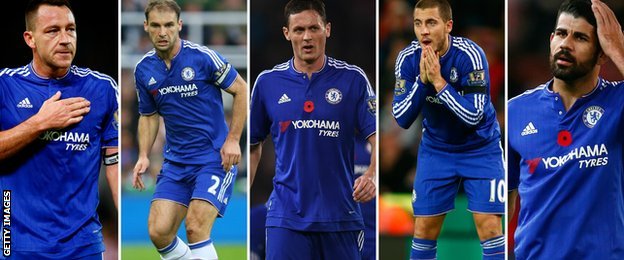
The performances of John Terry, Branislav Ivanovic, Nemanja Matic, Eden Hazard and Diego Costa have all been questioned this season
Chelsea's title triumph last season was built on the reliable old cornerstones of Terry and Branislav Ivanovic in defence, protected by the midfield blanket provided by Nemanja Matic.
The key to success, however, was found in the brilliance of Belgium forward Hazard and the two summer 2014 signings that transformed Chelsea from Mourinho's first season back at Stamford Bridge, Cesc Fabregas and Diego Costa.
The decline in performance of that 'Big Six' played a pivotal part in the slide that led to Mourinho's departure.
Father Time appears to have finally caught up with Terry, the former Mourinho "untouchable" who has been left out at stages this season, while Ivanovic's form has fallen off a cliff, despite the manager's continued faith.
Terry, embarrassed by his early substitution at Manchester City, suffered a similar humiliating fate in what proved to be the decisive loss at Leicester on Monday night. It was almost a mercy replacement by Mourinho after the 35-year-old had been tormented by the speed and movement of Jamie Vardy and Riyad Mahrez.
He had been at the heart of Chelsea's successes under Mourinho and to see him humbled and then taken off in such a fashion was symbolic of the wider crisis.
However, it is the failure of the other trio to produce that arguably had the biggest impact.
Belgian Hazard was world-class in the title season, scoring 14 league goals and creating nine, while Fabregas was the creator supreme with 18 assists. Costa justified every penny of his £32m fee from Atletico Madrid with 20 league goals. Even defender Ivanovic scored four and had five assists.
Eden Hazard Premier League statistics
|
||
|---|---|---|
| 2014-15 | 2015-16 | |
|
Appearances (including substitute) |
38 (100%) |
16 (100%) |
|
Goals |
14 (0.37 per game) |
0 |
|
Assists |
9 (0.24 per game) |
2 (0.13) |
Hazard's relationship with Mourinho has been the subject of much debate as he has struggled this season. Mourinho suggested Hazard more or less substituted himself at Leicester after the briefest attempt to run off an injury.
Costa has looked sluggish and occasionally overweight, struggling for goals and looking more in the mood for physical confrontation than tangible end product.
He even managed to embroil himself in a row with Mourinho, hurling a bib at his manager when it became clear he was only going to be an unused sub at Spurs in November.
The pair later laughed off the incident but it was the sort of open subordination that has rarely been seen during Mourinho's managerial career.
Fabregas's creative influence has been missed but the signs were there from the second half of last season when the stats started to stack up against him. He played 18 of Chelsea's first 19 league games and created 13 goals – but in playing 16 out of the last 19 he assisted only five.
When the big players go missing, even a manager of Mourinho's calibre is struggling – and ultimately it was a fight he could not win.
The fortress crumbles
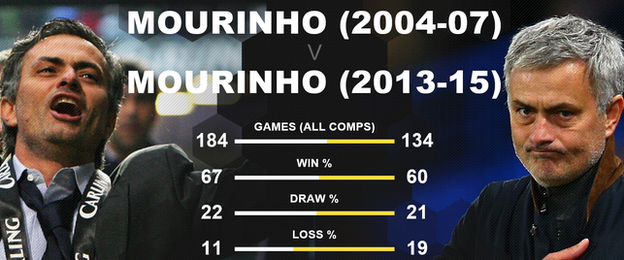
Jose Mourinho has contrasting records in his two spells at Chelsea
Put together the crucial factors of complacency, the curse of Carneiro and big players going missing, and you concoct a recipe for trouble – and the evidence is most compelling in how Chelsea and Mourinho's infallibility at Stamford Bridge has been stripped away.
In 98 home Premier League games before this season Mourinho had lost only once – to Sunderland on 19 April 2014. In the title-winning winning season of 2005-06, Mourinho's Chelsea won 18 games out of 19, a win percentage of 94.74%.
In the first eight home league games this season Chelsea lost four times – to Crystal Palace, Southampton, Liverpool and Premier League newcomers Bournemouth. The contrast was brutal as the Stamford Bridge fear factor evaporated.
Mourinho's successes have been built on that impregnability at home. Once that disappeared, along with poor form on Chelsea's travels, the rot had set in.
Third season syndrome?
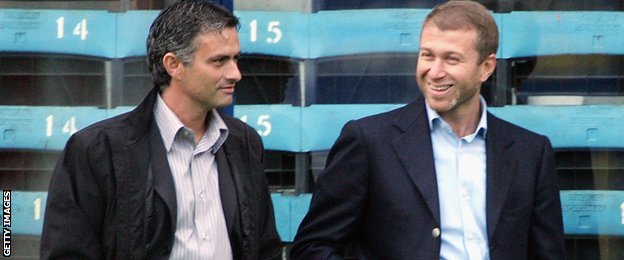
Jose Mourinho and Roman Abramovich's relationship first broke down in September 2007 when he was sacked
Mourinho came out all guns blazing at suggestions he suffers from third season syndrome – and in his defence he won the FA Cup and League Cup in his third full campaign at Chelsea during his first spell.
What remains in question after his latest departure is whether Mourinho is ever a coach for the long-term despite his talk of building for the next decade at Stamford Bridge and penning a new four-year contract at the start of the season.
Mourinho is the man for a quick, hugely successful fix but if a club is looking to build a dynasty then perhaps they should look elsewhere.
Would a manager with a more fixed long-term vision have shown more faith in Romelu Lukaku, still only 22 and sold to Everton for £28m in summer 2014? The young striker now looks what he was designed for when signed by Chelsea – a Didier Drogba in the making.
And there may well be questions about how Kevin De Bruyne developed so rapidly at Wolfsburg that the 24-year-old who left Chelsea for £18m in January 2014 ended up as a £55m signing for Manchester City in August 2015.
So is Mourinho simply a short-term strategist?
He lasted three full seasons in his first stint at Chelsea before his relationship with owner Roman Abramovich disintegrated and he was sacked with three years still left on his contract in September 2007.
Mourinho then had two seasons at Inter Milan, leaving – as he did at Porto in 2004 – after winning the Champions League in 2010, as well as Serie A for the second successive season and the Italian Cup.
He stayed three more seasons at Real Madrid, winning La Liga in 2011-12.
On 22 May 2012 Mourinho signed a new four-year contract at Real – on 20 May 2013 it was announced he was leaving.
Long-term contracts may be signed but it appears they do not mean longevity for Mourinho.
Did Mourinho deserve the sack?
It seems absurd to be even debating the point about sacking one of the greatest coaches in world football just months after winning the Premier League – but it is symptomatic of modern football and the scale of Chelsea's fall from grace.
And for an owner accused of being trigger happy in the past, especially with the sacking of Carlo Ancelotti, all of Abramovich's instincts were to keep Mourinho and allow him to somehow dig himself out of the hole.
Ultimately, however, he had no choice as Mourinho's relationship with some players clearly became toxic and there was no sign of him being able to navigate a way out of a situation he had never been in before.
In cold terms the decision is harsh but Abramovich gave Mourinho all the time he could as Champions League football next season – part of Chelsea's fabric – became a distant prospect.
Mourinho, as he turned on his players after the Leicester loss, suggested maybe it was his own brilliance that lifted Chelsea's players above their natural level to win the title last season. That level has dipped dramatically this season – so it can therefore be no surprise "The Special One" has paid the price.
